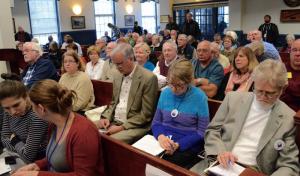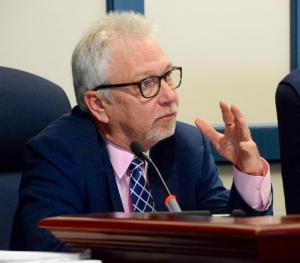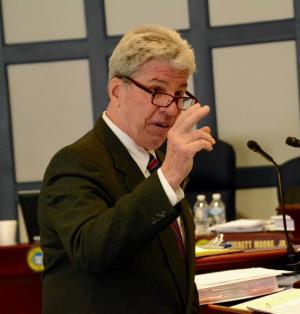Overbrook re-hearing packs council chambers
The court-ordered re-hearing of a rezoning request for Overbrook Town Center unfolded April 10 before a packed crowd in Sussex County Council chambers in Georgetown.
Maryland-based TD Rehoboth LLC sought commercial zoning for a 114-acre parcel zoned agricultural-residential, or AR-1, east of Route 1 at the Cave Neck Road intersection, north of Lewes.
Early in the hearing, TD Rehoboth attorney Jim Fuqua said the developer has amended the conceptual site plan for the parcel; the plan now calls for 50 acres for a 312,000-square-foot shopping center and 64 acres for a 135-unit single-family cluster subdivision. The plan proposed in the original application called for an 850,000-square-foot shopping complex, the largest ever proposed in Sussex County. "That's a 63 percent reduction," Fuqua said.
He said the developer amended the conceptual site plan based on comments by residents and county council members during the previous public hearing.
Fuqua said the subdivision application was filed in February. "The site plan is for another day. Zoning is the only issue before county council," he said.
County attorney J. Everett Moore instructed council that it will vote on the original rezoning application. "This is a new public hearing but not a new application," Moore said.
Moore said council can use all material in the public record from the previous hearing as well as the new hearing to make a decision. Piled together, papers and documents on the Overbrook application form a stack that rises nearly 24 inches high.
Fuqua said council must make its decision based on established legal and legislative principles and the public record. "It's not a popularity contest," he said. "This is not an ordinary situation, because you've already voted. I know we have the burden of convincing you to change your vote."
If the rezoning is approved, the developers would submit the amended commercial site plan to the county planning and zoning commission for review. "You might ask why we need 114 acres zoned CR-1," Fuqua said. "We don't. If you rezone, we are asking for just the 50-acre site."
Robert Witsil, attorney for the Overbrook Town Center Coalition and several residents opposed to the application, said Fuqua failed to discuss the location of the parcel in an environmentally sensitive developing district overlay zone. "The ordinance is not discussed by the applicant because it kills the application. It's the key to denial," Witsil said.
He said the only permitted uses on the parcel are those allowed in AR-1, agricultural-residential, zoning. "The permitted uses in the underlying zoning category have been the same since the early 1970s. The commercial use as proposed is not permitted in this zone. No one can argue that the owner is entitled to a change of zone," Witsil said.
He said council's recent denial of a rezoning application for a parcel on the east side of Route 1 near Milford sets a precedent for preservation of the Route 1 corridor.
At the end of the nearly six-hour hearing, council voted to defer. Council has up to 30 days to vote on the application.
What's permitted in a growth zone?
Fuqua said the property owner has an option to sell his land to be developed because the parcel is located in a growth zone and along a major arterial road, the two main factors outlined in the 2008 county comprehensive plan.
"That's the reason this site was chosen when council made the decision to place the parcel in a growth zone," he said.
Fuqua said the developer started 10 years ago to search for a parcel in eastern Sussex County for a large-scale shopping center. "Designation as a growth zone was the catalyst to start the process toward a rezoning application," he said.
"It could have been designated a rural area, but that's not what occurred," he said, adding the future land-use map in the plan has the force of law.
Witsil disagreed. He said the use of the parcel is dictated by the underlying AR-1 zoning in the overlay zone.
"The owner is entitled to AR-1 zoning," Witsil said. "No one is taking property rights away. But this is an illegal spot-zoning application. The key reason for turning this down is there is no provision that land in a growth zone is entitled to upzoning.
"The commercial use as presented is prohibited in this overlay zone. They cannot argue that they are entitled to a change of zone," Witsil said.
"It's AR-1 and nothing else," said Councilman George Cole, R-Ocean View. "There is not anything more than that; that's all they have. In my opinion, that's how we address property rights – by what the ground is zoned."
Attorney says tourists are game changer
Fuqua said there are very few open parcels for large-scale commercial development remaining in eastern Sussex County. He said the commercial corridor along Route 1 from Nassau to Dewey Beach is fully developed.
He said land north of the parcel is designated as a rural area. "Basically that leaves the 1½ miles from the [Nassau] bridge to this parcel. It's the only parcel available for large-scale use in Sussex County," he said.
Fuqua said it was incumbent on council to plan for future commercial growth as the county population continues to grow. He said in 1970 when the Route 1 corridor between Nassau and Dewey Beach was zoned commercial, the population was 80,300. Today, the population is more than 215,000 with a seasonal population of 314,000. It's estimated the population will increase to 260,000 with a 385,000 seasonal population in 2045.
Fuqua said that doesn't include the 3.2 million tourists who visit Sussex County each year. "And they come for dining, the beach and shopping," he said. Forty percent of the $1.9 billion spent by tourists is spent in Sussex County, he said.
Witsil took the opposite approach. "Perhaps there is no room for this application. That's too bad. A commercial district should not be there. Your plan does not anticipate this type of use on this parcel," he told council.
Several residents who testified said the proposed shopping center should be located in a more central location in the county along either Route 113 or Route 13, which are also major arterial roads.
Cole questioned the need for a major shopping center when his research shows a downward trend in shopping center development.
Fuqua responded that the 3 million tourists who come to the area change everything as far as shopping demand is concerned.
Rich Borrasso, representing the Overbrook Town Center Coalition, said the parcel may be open to development, but that doesn't mean it has to happen. "You have a rare opportunity to protect valuable resources," he said.
Investment Level 3 vs. Level 4
Since the previous public hearing, state planners have downgraded the parcel from investment Level 3 to Level 4 in the Delaware Office of State Planning Coordination Strategies for State Police and Spending.
Moore said council should consider the updated Level 4 as the parcel's designation.
Fuqua said the change was a total contradiction that makes no sense because state transportation officials are already committed to spending millions of dollars for a grade-separated interchange with an overpass at the Route 1-Cave Neck Road intersection.
He said the change was made after the planning and zoning and county council public hearings.
In addition, he said, the change ignores the county's comprehensive plan, which designated the parcel as a growth zone, and the change was never presented to the planning and zoning commission for a public hearing. "Level 3 or 4 is irrelevant to your decision," he told council. "State strategy maps are not land-use plans."
He said council should make its decision based on the comprehensive plan and zoning regulations.
Witsil disagreed, arguing the change to Level 4 is very significant. "It's the guideline to all state and county agencies where the state will spend money," he said.
He said development in Level 4 areas should support and be compatible with agriculture and preserve the rural landscape, including single-family homes.
"Commercial development is not recommended," he said. "It's less suitable now in Level 4."
Borrasso presented council with a binder filled with comments concerning the change to Level 4 collected by the state from its website. "The vast majority – and most from this area – were in support of the level change," he said. "Based on the Level 4 factor, this should be denied."
Court orders a new hearing
The application has a long history. Council voted 4-1 April 12, 2016, to deny a rezoning request filed by the developer, from AR-1 to CR-1, commercial residential, for the parcel of farmland.
The developers filed suit June 8, 2016, in Chancery Court against council, stating three council members who voted against the application made statements not supported by the public record. They said the "vote taken to deny the rezoning of the property should be permanently enjoined and a new vote ordered."
Council members Mike Vincent, Sam Wilson, George Cole and Joan Deaver, who has since retired, voted against the application. Councilman Rob Arlett voted in favor. The county's planning and zoning commission had recommended approval of the application.
As a member of the county's planning and zoning commission at the time, Councilman I.G. Burton voted to recommend denial of the application.
On Aug. 11, following briefings and oral arguments, the court granted the plaintiff's motion and ordered a new public hearing.
Vice Chancellor Joseph Slights wrote: "The rezoning application must be re-submitted to council for another vote. That vote will be what it will be. And so long as the record of the vote is adequate to allow for meaningful review, and the vote itself is not the product of arbitrary or capricious decision-making, the results of the vote, whatever they are, will stand."
Next week: Traffic, farming and environment issues and concerns expressed by residents.
The two state investment levels
LEVEL 4
Lands that are rural in nature where the bulk of the state's open space, natural areas and agricultural industry is located. The state supports development that is compatible and enhances agriculture, agri-business and appropriate visitor activities. New home construction is discouraged with limited infrastructure investment.
LEVEL 3
Lands where new development is expected in the near future and lands adjacent to fast-growing areas that are experiencing development pressure with low-density and rural housing.
Overbrook Coalition offers reasons for denial
The Overbrook Town Center Coalition presented council with five reasons to deny the application.
Once the commercial rezoning is approved, the developer could build any mixture of permitted commercial uses on the property.
The rezoning is out of character with the zoning and the agricultural and residential uses on surrounding properties.
In Level 4 areas, the state promotes retention of the rural landscape and to preserve open space and farmland.
The parcel is subject to the state's corridor capacity preservation program, which requires any development not to increase traffic congestion.
DNREC has determined that a significant portion of the parcel is in an excellent groundwater recharge area. Any use that increase impervious cover could adversely affect groundwater and any contaminants could impact water and the surrounding ecosystem.











.jpg)













































